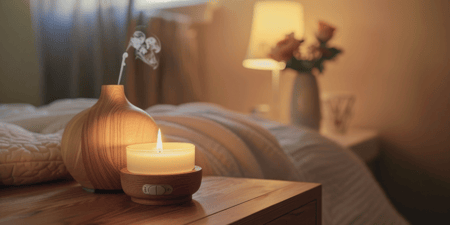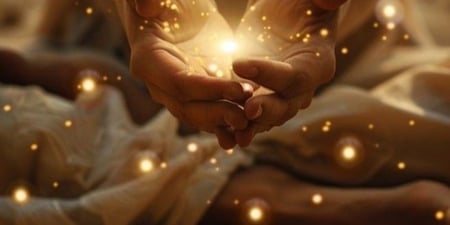- Home
- Your Sanctuary
- Wellness articles
- Healthy Living
- Sleep
- Blue Light And Daylight – The Sleep Conundrum

Blue light is essential for regulating our 24-hour sleep-wake cycle, or ‘circadian clock.’ It is what drives us to be tired at night and alert during the day. While we get most of our blue light from the sun, it is also emitted from our electronic devices. According to Dr.Kara Hartl [1], a medical doctor and blue light expert, this is disrupting our sleep and harming our health.
Blue light is essential for regulating our 24-hour sleep-wake cycle, or ‘circadian clock.’ It is what drives us to be tired at night and alert during the day. While we get most of our blue light from the sun, it is also emitted from our electronic devices. According to Dr.Kara Hartl, a medical doctor and blue light expert, this is disrupting our sleep and harming our health.
In an article written for Thrive Global[2], Dr. Hartl helps us to understand what blue light is, and how it plays an important role in regulating circadian rhythm.
While blue light itself is not inherently bad, too much of it at night from our TVs, laptops, or phones, may be tricking our bodies into thinking it’s daytime. This is causing a shift in the natural rhythms of the body, leading to disturbed sleep and other unwanted consequences for our health.
Dr Hartl provides suggestions on how to minimise blue light exposure at night, as well as other lifestyle and dietary tips that support a healthy circadian rhythm.
Firstly, exposing yourself to natural light during the day and limiting artificial light exposure at night is recommended. There are also options to physically block the blue light by using screen protectors or blue light-blocking glasses. Many phones now have the option of using night-time light settings. Lastly, Dr Hartl advocates a diet full of green, leafy vegetables and foods that contain beta-carotene (think carrots and pumpkin), which contain eye-strengthening nutrients for extra protection.
By becoming more aware of the risks of sleep disruptions, we can take the necessary steps to improve the quality and duration of our evening slumber.
References
1. Kara Hartl. Thrive Global; 2024.
2. How Blue Light Affects Our Sleep Cycle and Quality of Sleep. Thrive Global; 2021.
Our purpose-driven editorial team has selected articles to share with our global community from thought leaders, commentators and subject matter experts in the traditional & complementary medicine sector from around the world. If you have any suggestions, comments or feedback, please contact us here.
Share this page:
- Telegram
- Messenger
- Copy link
Disclaimer: This Content has been developed from our generous global community and is intended for informational purposes only. This Content is not, nor is it intended to be, a substitute for professional medical advice, diagnosis, or treatment and should never be relied upon. Further, the personal views and experiences published are expressly those of the author, and do not represent the views or endorsement of SoulAdvisor through the act of publication on our site.
Books
Categories
Similar articles in Sleep

Insomnia? 6 Holistic Bedtime Rituals to Transform Your Rest
Mind racing when you hit the pillow? You're not alone. Discover how a simple, science-backed bedtime [...]

Getting More Sleep Can Reduce Long-Term Health Risks
We all know how essential sleep is for our physical and cognitive health but the long-term impact of [...]

Are You Suffering From ‘COVID-Somnia?’
During this time of unprecedented global disruption, many people are finding that getting sufficient [...]
Similar articles in Healthy Living

How to Create a Personalised Wellness Plan: Your Complete Guide to Holistic Health
In a world where there’s an overwhelming amount of wellness information, such as social media trends [...]

Coming Home to My Body: A Lesson I Needed
When I was reminded how deeply my body communicates with me—and how often I ignore it. After eating [...]

Healing and Hope: A Holistic Path to Addiction Recovery
Whenever we consider addiction recovery, whether it’s drug, alcohol, or even a destructive habit rec [...]

Insomnia? 6 Holistic Bedtime Rituals to Transform Your Rest
Mind racing when you hit the pillow? You're not alone. Discover how a simple, science-backed bedtime [...]

7 Yoga Practices For Detoxing
When I think of detox, I think of the body taking out the trash! I think of quitting alcohol, coffee [...]

Exercise Boosts Brain Power
Recently, I read the book Brain Rules by Dr. John Medina. It is a New York Times bestseller, and the [...]

Manual Lymph Drainage - What’s all the ‘buzz’ about?
Most massage modalities deal with musculoskeletal issues, however, Manual Lymphatic Drainage offers [...]

Food as Medicine: Reclaiming Health Through the Power of Nature
Reclaim your health with the ancient wisdom of "food as medicine." Discover how daily choices, mindf [...]

Dance Like Nobody's Watching
When I first heard this quote, my first reaction was: “Why?”

3 Ways Mental Health Impacts Your Physical Wellbeing
"Health is a state of complete physical, mental and social well-being, and not merely the absence of [...]

The Healing Power of Aromatherapy Bath
Water is such a nurturing element on our earth, be it the revitalised feeling you have after a swim [...]

Unlock Happiness and Creativity by Moving your Body
During winter we tend to retreat and keep ourselves more indoors and rugged up; yet there are studie [...]

Fascia: Understanding and Enhancing the Functionality of This Important Connective Tissue
Fascia, the body’s connective tissue network, supports muscles, bones, and organs while enabling mov [...]

Menopause: Ways To Reduce The Impact Of The Journey
If I told you the number one reason why most women suffer during menopause, would you do whatever it [...]

From Insanity To Clarity
A personal journey of recovery through chronic illness, the disease to please and being powerless ov [...]

Common back pain myths and how to overcome your pain
Debunk common back pain myths, promote staying active, explore non-surgical treatments, and emphasiz [...]

Fit Over 40: Your Guide to Health and Fitness
Welcome to the journey of becoming fit over 40! This guide is perfect for those who are interested i [...]

Dancing Meditation... Are You Rocking Your Groove?
Do you love to dance? I love to dance! Everywhere I go, I dance. It can be quite comical, but [...]

Revolutionising Wellness: A Holistic Expedition into Mind-Body Harmony
Ditching the Norm: Uncover the Path to Holistic Wellness. Dive into Kinesiology and Bio-Resonance fo [...]

Wisdom Gifted To Me Through My Naturopathic Practice
The face of the natural health and wellness industry has changed greatly over the last two decades.

Five Ways To Strengthen Your Gut Integrity
Keeping a healthy, strong gut lining is critical to good health.

Connecting With Your Inner Healer - Where True And Lasting Health Begins
During times of extreme stress and overwhelm related to debilitating symptoms, it can be challenging [...]

The Power of Breathwork : Balance, Healing and Radical Change in Your Life
Breath by breath let go of fear, expectation, anger, regret and frustration. With each passing da [...]

The Power Of Distance Kinesiology
Kinesiology is a rapidly growing field and now practised in 100 countries around the world. It’s est [...]

The Umbrella of Herbal Healing
It’s the oldest form of medicine on the planet. The healing properties of herbs have been accessed f [...]

What Are The Different Types of Vinyasa Yoga?
Yoga can benefit the body, mind and soul in so many unique ways. It helps you to better connect with [...]

Whole Food Living: Honour Yourself, Honour The Planet
A whole food diet is so much more than a healthy lifestyle choice. When you choose to eat a whole [...]

How Remote Energy Healing Works
The ancient practice of energy healing, based on the idea of being able to consciously direct a subt [...]

The History of Naturopathy
How did naturopathy start, and how is it beneficial to humans? Naturopathy has been in existence [...]

The Online Naturopath Experience
Like so many other complementary therapies, naturopaths have increasingly moved to virtual consultat [...]

The Rise of Online Yoga
The pandemic created endless opportunities for us to participate in health and fitness classes virtu [...]

Live Longer And Healthier By Doing These Five Things
In Australia, we are lucky to have of the best life expectancies in the world – as of 2018, we were [...]

How Eating Colourful Fruits And Vegetables Could Help Boost Memory
You may have heard of the term ‘eat the rainbow’, and it’s a term that exists because the phytochemi [...]

Leaky Gut: The High Impact Gut Problem With A Low Profile - PART 3
In part three of our gut series, we look at leaky gut. In parts one and two, we learned about small [...]

SIBO: The High Impact Gut Problem With A Low Profile - PART 2
In our last article on SIBO, we identified the key symptoms, diagnosis and treatments. We also spoke [...]

SIBO: The High Impact Gut Problem With A Low Profile - PART 1
When Hippocrates suggested that all disease starts in the gut, he was right. Half of the Australian [...]

How To Bring The Earth Inside To Repair Your Health
The pandemic has certainly proven to all of us that excessive time indoors can negatively impact our [...]

4 Ways to Influence Your Immune System
Our immune system is crucial to the state of our health. Interestingly, we can influence the state o [...]

How Beetroot Juice Can Bolster Healthy Ageing
Is a glass of beetroot juice part of your daily diet? A new study shows that drinking beetroot juice [...]

Getting More Sleep Can Reduce Long-Term Health Risks
We all know how essential sleep is for our physical and cognitive health but the long-term impact of [...]

4 Exercises To Try If You Have Back Pain
Chances are that you may have experienced back pain at some point in your life, given it is estimate [...]

Slow Ageing Naturally With Antioxidants Rich Diet
As women enter their 40s, not only do their hormones start to decline but the physical effects of fr [...]

Is Your Body Sending You Unusual Stress Signals?
A tight chest, shallow breathing and a clenched jaw are all tell-tale signs that the body is stresse [...]

Four Memory-Boosting Brain Hacks
The brain has a remarkable ability to forge new pathways by rewiring itself in response to new infor [...]

The Healing Properties Of Therapeutic Bathing For Chronic Pain
Chronic pain, poor sleep, muscle stiffness and extreme fatigue are just some of the debilitating con [...]

Want To Stop Chronic Disease In Its Tracks? Try This.
Reducing inflammation by eating better could cut our risk of developing certain chronic diseases so [...]

5 Ways To Fortify Your Immune System
Given we’ve spent the past 18 months dealing with the challenges of a pandemic, the word ‘immunity’ [...]

Are These Herbs On Your Longevity Menu?
Growing older is a natural part of life. With each passing year, we are motivated to support our hea [...]

Training Your Immune System: Here’s Your Checklist
The intricate network of cells, organs and chemicals that comprise the immune system do a remarkable [...]

Are You Suffering From ‘COVID-Somnia?’
During this time of unprecedented global disruption, many people are finding that getting sufficient [...]

The Art Of Taking Tea Mindfully
In a world filled with chaos and stress, it is important we find ways in our daily lives that can he [...]

Collagen: Healthy Aging From The Inside Out
Collagen is known as the ultimate anti-aging elixir, and has long featured in masks, topicals and sp [...]

Belly Misbehaving? You May Need The FODMAP Diet
Is your belly misbehaving? You are not alone. Around 20% of Australians have Irritable Bowel Syndrom [...]

The Life-Giving Breath Of Qigong
The ancient Chinese practice of Qigong, based on the concept of amalgamating energetic and physiolog [...]

Food Of The Future
The idea that ‘happiness comes from within’ is something we have heard time and again. But now, scie [...]

Food Balance: How To Achieve Optimum pH Levels
You may have heard about acid/alkaline or pH balance on your health travels, but did you know that e [...]

Ease And Grace Through Stretch Therapy
Stretch Therapy is a term created by Kit Laughlin who created and formerly ran the Strength & Flexib [...]

Connecting With Your Feet
Have you ever wondered how a Reflexologist works and is able to ‘pick up’ certain imbalances or thin [...]

10 Creative Ways To Move Your Body & Lose Weight Without Even Knowing It
The movement of the body has numerous benefits. By moving your body you not only move the muscles an [...]

Overcoming Food Fear
Food fear is a strand of emotional eating which can have debilitating effects on your life. I know t [...]

